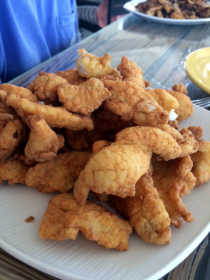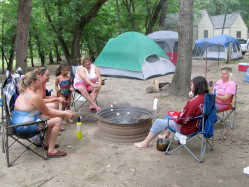- Missouri campgrounds resurgence (5/30/20)
- August a fantastic month for catfishing (8/11/18)
- Kayaking, canoeing good way to spend hot summer days (7/27/18)
- Hot weather means hot catfishing (7/7/18)
- Boat buyers have abundant options (6/16/18)
- Warm weather invites camping (6/9/18)
- Topwater fishing is a blast (6/2/18)
A little creativity goes a long way on camping excursions
Saturday, August 20, 2016

A platter of fresh caught and then fried on a camp stove is hard to beat. (Photo by Ken White/Special to NDM)
If you like to eat like I do while on an outdoor trip, there are many ways to enjoy meals while enjoying your favorite kind of outing without spending a lot of time cooking.
Most people feel that the more work that can be cut from cooking, the more time there is for fun. Today's outdoor person has a lot going for them, such as reliable camp stoves and the new freeze-dried foods that really do taste fresh. Insulated coolers, aluminum foil and non-stick pots and pans are just a small list of recent developments to make outdoor living easier.
Years ago, I found that your menu can include freshly caught fish even when your outing isn't ostensibly a fishing one. If you are camping or on a hike, pack a little fly or spinning takedown fishing rod and reel in case you spot a likely looking stream. Panfish offer good sport on light tackle, and they are delicious. Nearly every stream, pond or lake has good populations of these finny fighters.
While in the outdoors, you should never be without a fire source. It might be a camp stove or a wood fire. Fire starters are usually easy to find. Some ingenious campers have come up with a variety of fire starters including cutting a newspaper into strips about four inches wide, rolling them into small diameter "logs," then saturating each with paraffin or candle wax. The logs will light easily and burn for quite a while, providing fuel as well as a starter.
Although you may plan to use a camp stove most of the time, there are times when cooking over a wood fire can be fun as well as improving the taste of some foods like corn on the cob, potatoes and grilled or barbecued meats.
The best woods are hard woods like oak, hickory or fruit woods.
Another indispensable item whenever you have room for it is an insulated cooler or ice chest. It's amazing how long a cooler will keep ice solid and drinks cool.
Other things I have learned about outdoor cooking while camping include: a pot can serve nicely as a dishpan. After it is used, wash it well and sanitize it in front of your fire. Never use rocks you take from a lake or stream to make a firewall.
Gent Smith, Sedalia, will tell you about that. Smith was camping by Pomme de Terre and gathered several big rocks around the lake to make a fire ring. While cooking, the moisture laden rocks started cracking and one exploded hitting Smith on his arm. He still carries a big scar from that experience.

A group of campers gather around a fire ring to make smores while camping along the Sac River. (Photo by Ken White/Special to the Daily Mail)
Dave Jackson, Springfield, has been a camper and cook for more than 20 years. He said, "The more you go, the more you learn how to save time to make the trip easier. I bring a shoe bag and hang it on a low tree limb to put things that are easily misplaced, like a spatula and other kitchen items.
"I make a frame to hold pots and pans by driving two long forked sticks into the ground near the fireplace. Next, I put a pole into the forks and find a few small limbs at an angle to form a hook, then hang the pots on them.
"There are many ways to save time and have fun. You are always learning new ways to do both. I have taken many of my ideas from other campers. Most campers are happy to share their time-saving tips."
There are many bits of knowledge and tricks that, when learned, will increase the fun, comfort and safety on any outdoor outing from fishing, hunting, camping or cooking.

